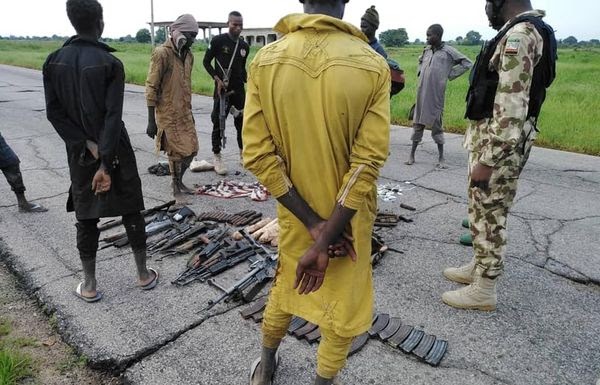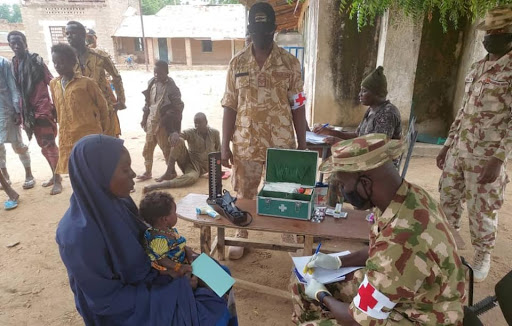
Authorities need to exploit the factors driving Boko Haram fighters and their families away from the terror group, as a new wave of surrenders is being recorded.
Desertion among Boko Haram fighters and movement of families out of enclaves located in the hinterland are not a new phenomenon but are driven mainly by several factors, including discontent, internal skirmishes, health issues, and military campaigns.
HumAngle previously reported about former Boko Haram fighters that personally took steps to surrender to authorities or silently reintegrated into cities across the country.
On Wednesday, Aug 4, the Army disclosed that some Boko Haram fighters had surrendered to Nigerian troops stationed at Banki junction in Bama, a continuation of a recent trend of fighters handing themselves over to authorities.
According to the Army, the former fighters based in Sambisa arrived accompanied by adult females and children. They lamented that the condition in the forest had become untenable, hence their surrendering.
Over the past few weeks, new arrivals have handed themselves to security officials in the same area.
Bama Local Government Area located in southeast Borno State and far north region of Cameroon near the border with Nigeria, where former Boko Haram fighters are now turning up, are close to the dreaded Sambisa forest.
Boko Haram was the dominant actor around Sambisa and the Gwoza-Mandara Mountain range axis until the rival ISWAP breakaway faction domiciled in Alagarno forest, Northern Borno, and Lake Chad carried out a raid in Sambisa, which culminated in the death of Abubakar Shekau and absorption of fighters and territories.
This has led to new dynamics within the groups and battlefield behaviour evident in a series of attacks on certain Nigerian and Cameroonian positions. However, the recent trend of arrival at camps and fighters submitting their weapons point to fracture and discontent within the alliance.

The new arrivals are processed through a routine that involves vaccinating the kids, military intelligence debriefing, registration of families by state authorities and humanitarian actors.
The male ex-combatants are categorised into low and high risks determining the follow-up actions from officials which could be trial or deradicalisation programmes.
It’s unclear if security officials’ procedures for managing the women and men include biometrics data collection.
In Cameroon, authorities were recently reportedly overwhelmed by the number of members fleeing Boko Haram. The former fighters are managed by the country’s Center for Disarmament, Demobilisation and Reintegration.
Effectively managing the deserters and families moving out of enclaves of Boko Haram can encourage more desertion especially by fighters not keen to join ISWAP.
The Institute for Security Studies (ISS), in a report published in March 2021, disclosed that uncertainty surrounding the fate of those who leave Boko Haram discourages others from doing the same.
More desertion doesn’t only reduce the human resources that would have been exploited, it provides an opportunity for officials to acquire valuable information on both groups.
This information includes cell phone data that can be utilised for achieving short and long term counter-insurgency objectives.
Furthermore, transnational cooperation in the management of former Boko Haram fighters would be beneficial for several reasons, including intelligence and behaviour mapping.
HumAngle understands some Boko Haram members have opted to move away instead of surrendering to state authorities or joining ISWAP, while some have remained defiant against ISWAP.
Support Our Journalism
There are millions of ordinary people affected by conflict in Africa whose stories are missing in the mainstream media. HumAngle is determined to tell those challenging and under-reported stories, hoping that the people impacted by these conflicts will find the safety and security they deserve.
To ensure that we continue to provide public service coverage, we have a small favour to ask you. We want you to be part of our journalistic endeavour by contributing a token to us.
Your donation will further promote a robust, free, and independent media.
Donate HereStay Closer To The Stories That Matter




